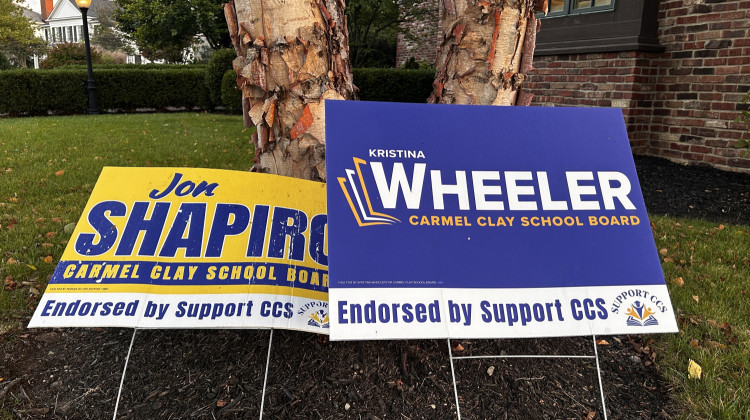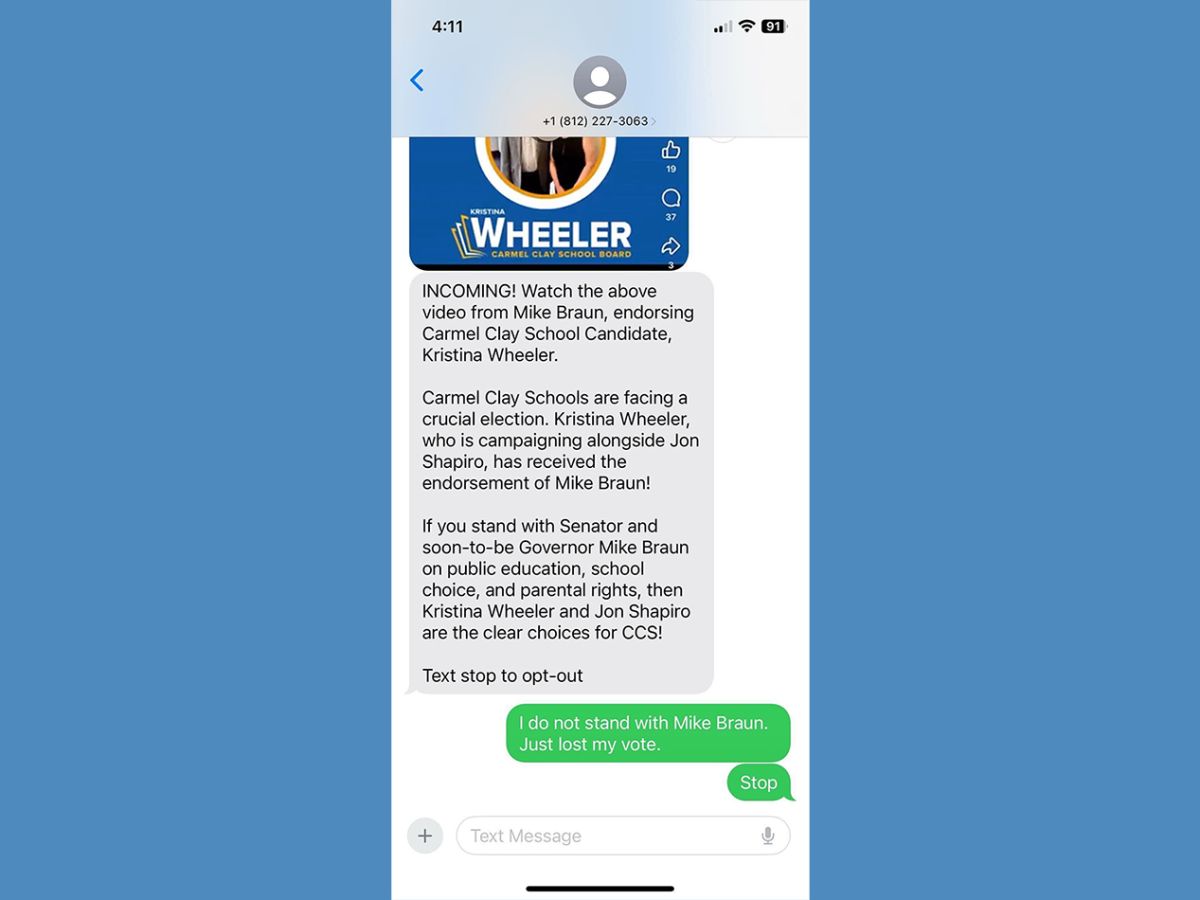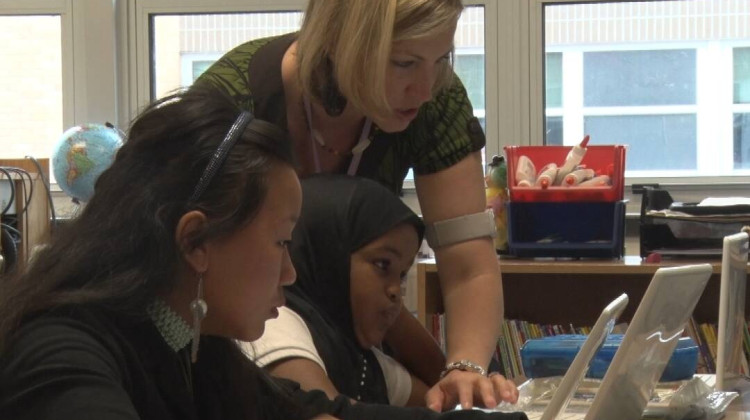
Carmel Clay School Board candidates Jon Shapiro and Kristina Wheeler were the subject a mass text that spread disinformation about their stances on education issues.
Eric Weddle / WFYIShannon Taylor knows who she’s going to vote for for Carmel Clay School Board. But last week she received an anonymous text message that — at least for a moment — changed her plans entirely.
Taylor is a parent of a Carmel Clay middle schooler. She’s also a registered Democrat and has consistently voted for Democrats since she turned 18. That’s why she was shocked to receive a text message that said Republican gubernatorial candidate Mike Braun had endorsed Carmel Clay School Board candidate Kristina Wheeler.
Wheeler and Jon Shapiro are running as a slate in the nonpartisan election for two at-large seats. They face two opponents — Dina Ferchmin and Robin Clark — who are campaigning as conservatives.
“I was really, really mad,” Taylor said, because Wheeler and Shapiro are not campaigning on their political affiliation. “And I just was, like, blown away, because, based on what I know about Braun and [Republican Lieutenant Gubernatorial Candidate Micah] Beckwith, that would not be in alignment with why I had chosen Wheeler and Shapiro.”
The text Taylor received stated that Wheeler and Shapiro shared Braun’s views on education.
“If you stand with Senator and soon-to-be Governor Mike Braun on public education, school choice, and parental rights, then Kristina Wheeler and Jon Shapiro are the clear choices for CCS!” the text message said. It also included a low-quality screen recording of a video that features Wheeler and Braun standing next to each other.
While the video is real, the message is fake. It's an example of political disinformation.

Shapiro and Wheeler both told WFYI that the text did not come from their campaigns or any group working on their behalf. Jennifer Cashin, who leads Support CCS — a nonpartisan political action committee backing Wheeler and Shapiro — said the mass text appears to have been targeted at Democrats in Carmel based on information they’ve gathered from supporters.
“The concerning part for me in that text message is the fact that they were deceitful about Kristina’s standings on educational platforms,” Cashin said. “In no way does Kristina align with Senator Braun’s education platforms.”
The message, which was sent to an unknown number of people, isn’t signed by anyone. WFYI called the number but it is inoperable.
Taylor initially believed the text message. She felt “bamboozled” by candidates who she supported. In anger, she contacted Shapiro on Twitter to express her disappointment. That’s when she learned the text was in fact disinformation intended to manipulate voters.
“If I had continued assuming that Shapiro and Wheeler were aligned with Braun, I would not have voted for them,” Taylor said. She said she wouldn’t have voted in the race at all because she doesn’t support the vision for Carmel schools laid out by the other candidates Dina Ferchmin and Robin Clark.
A spokesperson for Braun did not return a request for comment about whether he was aware of this text message and whether he endorsed Wheeler for the school board.
Melissa Beuc, with Carmel Excellence — the political action committee supporting Ferchmin and Clark — wrote via email that they did not send the text.
“We were not involved. We don’t work like that.” Beuc wrote.
The candidates who win the Nov. 5 election will determine the political makeup of the five-member Carmel Clay board and could greatly influence the future of the district.
Political context
During the 2022 election, Braun and fellow Republican U.S. Sen. Todd Young endorsed a slate of conservatives running for Carmel Clay School Board.
This year, his gubernatorial running mate, ultraconservative pastor Micah Beckwith, has endorsed Ferchmin and Clark. The Hamilton County GOP has also sent mailers to residents to encourage them to vote for Ferchmin and Clark.
The video of Braun and Wheeler appears to have at some point been posted to Wheeler’s campaign Facebook page. Cashin confirmed that the video is real. But she declined to explain why it was pulled from the campaign’s social media page. Wheeler also did not respond to a request for an interview.
In the video, Braun says he and Wheeler just had lunch at Schnitzelbank, a restaurant in Jasper — where Braun served as a school board member.
“She’s running for school board up in your area. I was on one for 10 years. In talking to her here at length here today, she would make a great school board member. Make sure you get her on your board,” Braun said in the video. Wheeler responds: “Thanks so much, Senator.”
The next few slides that follow state that “Kristina Wheeler is committed to keeping our Carmel Clay School Board nonpartisan. Kristina Wheeler has proven experience working with everyone in the community, regardless of their political leanings. From working with Kristina, Senator Braun knows that Kristina Wheeler is the right choice to build on success at CCS.”

Wheeler is a utilities lawyer and Cashin said she’s worked with Braun in her capacity as an attorney. Wheeler is also a participant in Hoosier Women Forward, a leadership training program aimed at empowering Democratic women to be active in politics and their communities.
In his gubernatorial bid, Braun’s education platform is based around universal school choice, boosting teacher pay and academic standards, as well as protecting parental rights, including “direct notification if a child requests a name or pronoun change inconsistent with their biological sex, and protect girls’ sports from biological male competitors.”
While Wheeler is campaigning on a platform that includes getting parents more involved in Carmel schools, she doesn’t align with Braun’s interpretation of parental rights, Cashin said. She added that Wheeler believes “public dollars should be going to public schools,” rather than diverting those funds to private schools, which a universal voucher program would continue to do.
Cashin said the fake text was clearly intended to manipulate voters into thinking Wheeler and Shapiro agree with Braun’s positions.
“Trying to weaponize the ability of a candidate to work with all members of our community is just deceitful. It's unethical,” Cashin said.
Disinformation via text
Darren Linvill, an expert in disinformation and co-director of the Media Forensics Hub at Clemson University, said it's incredibly difficult to trace the origin of texts that spread disinformation.
Linvill said disinformation via text message is becoming increasingly common.
Last year, following the Oct. 7 Hamas-led attack on Israel, a text message purporting to be from a group called “the Progressive Democrats of Indiana” invited recipients to join a Free Palestine Rally. When recipients texted “stop” in response, they received a message stating they had opted out of messages from the Hamilton County Republican GOP. The Hamilton County Republicans denied involvement.
“I'm not at all surprised to see these kinds of lies spread by text message,” Linvill said. “It's surprisingly easy to do this, yes, and surprisingly inexpensive.”
Federal rules require prior consent for political text messages sent using an autodialer, while texts sent manually can be done so without consent.
But Linvill said sending a text message “manually” often entails simply hitting a button on a keyboard. He said it’s also easy to target text messages to certain demographics or types of voters based on publicly available data.
Aaron Dusso, an associate professor of political science at Indiana University Indianapolis, said local elections are particularly susceptible to disinformation because there’s typically far less information available about candidates running for school board than there is for candidates at the national level.
“For me as a voter, it'll be harder for me to know whether or not this is true, and therefore it's more fertile ground for any nefarious actor out there to engage in this type of negative kind of texting,” Dusso said.
He adds that only a small number of voters need to be convinced of a lie to sway a local election, because local races can be won or lost based on just a handful of votes.
Dusso also reviewed the fake text about Wheeler and Shapiro. He said it’s likely it’s already deceived an unknown number of people, “because more people aren’t going to take the time in order to find out if it’s true.”
Dusso and Linvill say voters should be skeptical of political messaging sent via text, and it's better to get information about candidates from credible sources.
“It's important to educate yourself from sources you trust,” Linvill said. “Especially in our own community, elections like this, you know, there's events you can go to and talk to these people face to face.”
Shannon Taylor, the Carmel parent, still plans to vote for Shapiro and Wheeler. She’s thankful she made the effort to reach out to Shapiro after receiving the deceptive text message.
“It's incredibly alarming, because, you know, if I had not been so reactive, I probably wouldn't have uncovered that it was a falsehood,” Taylor said.
Contact WFYI investigative education reporter Lee V. Gaines at lgaines@wfyi.org.
 DONATE
DONATE






 Support WFYI. We can't do it without you.
Support WFYI. We can't do it without you.